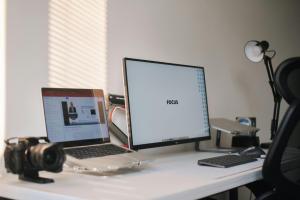The Problem
Without the use of video interview, I found myself while I sat there with my eyes closed,while I try to listen and focus on what the candidate said. Sometimes I would catch a phrase that I could understand and write a comment, but it was no use, most of the stuff I did not understand. No, I wasn’t listening to how to implement neural networks code in Java, I was conducting phone interviews with offshore resources.
This experience is very typical when a manager creates a a team with offshore resources. We tend to use the tools we know, and we know the phone very well. So the first thing we do is to schedule phone interviews.
Why is it that in the 21st century we are still using tools that were invented 140 years ago?
We can have video conversations with a loved one around the world and yet we still do phone interviews the old fashioned way.
Granted, not everybody is stuck in the 19th century, a lot of people use tools like Skype, Blue Jeans, and Google Hangouts to perform interviews. But why is our default tool the regular phone?
Perhaps we are in a transitional period where technology is slowly permeating the realms of human resources and interviewing. But I can’t wait to embrace the adoption of video technology as a standard for all meetings. It wasn’t long after having that phone interview that
I decided to make all future interviews Video, and what a difference it made. I could see the candidate, I could establish a limited relationship with another human, I could look for nuances of body language and determine when a question made them feel nervous, a trait we all use to determine whether the candidate is not being truthful.
The Next Step
But this paper is not to highlight the benefits of a video interview, we all know video is king.
This paper is to propose the next step for video interviews and all the benefits that come with it.
What is this next step? You use video-recorded interviews. Move beyond just what the candidate says, focus on the complete package.
Don’t clutch your pearls too tightly. It isn’t a bad thing, and I will explain why.
We worry about a permanent record on video. We fear that somewhere along the interview process we are creating evidence that can be used against us in a lawsuit.
While video is very compelling as evidence in a case, when it comes to interviewing, it is your best friend.
Most problems that arise from an interview gone wrong is the “he-said-she-said” back and forth where truth is hard to establish. But imagine a situation where you –the interviewer– have a list of HR-approved questions that are now being asked of the interviewee.
You are no longer responsible for how or what is being asked, you are responsible for evaluating the response from your candidate.
All of a sudden a video record of the conversation is your best friend. It is no longer about what you said, it is about what the candidate said.
Objections to Video Interviews
“But, but … if you video-record the interview, there are more chances of discrimination because you can stop the interview halfway.”
- Let’s stop right here for a second and evaluate that statement. Discrimination happens whether you use a tool or not. If you wish to discriminate against Hispanics, the moment you see a resume with the last name Gonzalez, you will throw it in the trash can. Discrimination is a problem of character, not of the tool you use.
- If you stop the recorded interview halfway, is not because you are racially discriminating. It is because you have detected a performance fault. As a manager, you make decisions on who to hire based on the best answers given, and the best examples of past performances. Why would you continue watching an interview,when you already know the canidate is no fit? Would you watch a movie just because you have to?
“But, but … people don’t feel comfortable video recording themselves.”
- Have you ever been in an interview? There is nothing comfortable about it. Your past performance is on the line. Secondly, you are interviewing for your dream job. And thirdly, you know little about the technology the company is using. To sum up: you have lost your job and want to be hired. The list of reasons why you are nervous or uncomfortable goes on and on.
- While it is true that the older workforce may feel a little uncomfortable about video-recorded interviews, the next-generation workforce is anything but! This is the generation that grew up with YouTube, Instagram, Snapchat, and TikTok. Sitting in front of a camera recording video is second nature to them. To them, it is nothing more than just another video in the cloud. Let’s embrace that and stop making excuses.
Benefits
Now that I’ve addressed some of the arguments against video-recorded interviews, let’s examine the upside of using this technology.
- You don’t have to be there
The interview can happen at any time between the time you send the invitation until the time you receive a notification of completion. Think about this, you didn’t have to be there. This means that trying to find a time when both of you are available is a thing of the past. You send the request to the candidate when you have time, and the candidate records his responses when he has time. In the age of automation, this is what it looks like for interviews. - You watch interviews on your own time
The day has been hectic, you’ve had too many meetings and the front desk calls you to tell you that your 2:00 pm interview has arrived. Are you in a position to evaluate a candidate effectively? Wouldn’t it be better if the interview happened when you are clear-headed and can make clear decisions? If all your interviews were video recorded, you could. You could evaluate them on your time, and whenever you decide you’ve seen enough, you can stop it.
How many times have you continued an interview just because you are being polite? You made the decision the candidate wasn’t right, but because you are a decent human being you continue the interview knowing full well he is not the right candidate.
Immediate Advantages
How Many Hours Could You Save if You Were Able to Stop the Interview? Spoiler Alert: A lot!
- You share the interviews with co-workers
Because interviews are recorded, you can ask a coworker for his opinion on the merits of an answer. Maybe the candidate touches on a point you are not familiar with and want to get a second opinion on the topic, no problem, the interviews are clips that can be shared. - No time wasted interviewing unsuitable candidates
We’ve all been there – a candidate strolls through the entryway and within the first 30 seconds we know they’re not simply going to fit. Most of us are far too well mannered to say: “thanks but we’re going to pass.” Instead, we go through the whole interview process and waste everyone’s time.
With a video interview, you can watch the first 30 seconds of a candidate’s interview, if you think they’re just not suitable, simply move onto the next candidate.
Wrap up
There are many benefits from having recorded interviews that I didn’t talk about. However, one is too good to miss. When you create online interviews, you should standardize your questions you ask of your candidates. Your auditors will like this a lot.
With no real downsides to doing online interviews, why do we still fight it? Why can’t we just embrace change? Let’s help the industry move from old fashioned phone interviews to online recorded interviews. The difference is that in one you are using rotary phone technology, while with the other, you use a modern automation tool waiting to be exploited. What are you waiting for? Try AskAway for Free now!









